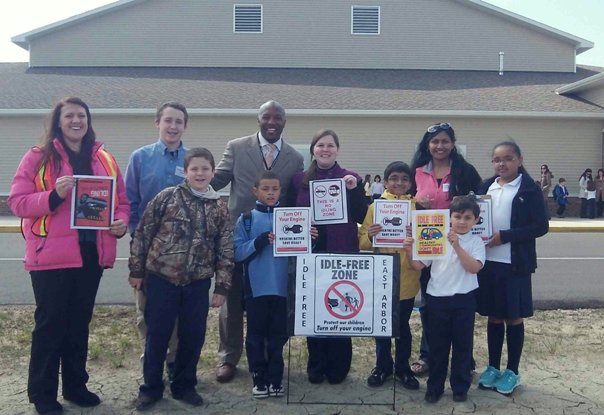No idle mother: Sheetal Patcheak's crusade to reduce engine idling in Washtenaw County
The Patcheak family (from the left) Keshav, 6, Vishnu, 10, Sheetal, and Madhav, 1, inspires other families to take action for environmental change in their schools. (not pictured: Dad, Terry Patcheak)
Sheetal is concerned about engine idling both as a health threat to our children and an environmental scourge. She points out that according to Environmental Protection Agency (EPA) statistics, “One minute of idling emits more carbon monoxide than three packs of cigarettes. Now, we are all aware of smoking. We don’t even want people smoking in front of the buildings anymore, but we don’t even think twice about idling! There are 40 toxic pollutants [in engine exhaust].”
Schoolchildren are especially vulnerable to this type of air pollution. “[Exhaust] is known to cause asthma, allergies, lung problems, and cancer. The exhaust pipe is right where kids are standing at the dismissal line. They sit on the cement waiting to be picked up,” says Sheetal.
On weekday mornings and afternoons Sheetal ferries her sons, Vishnu, 10, and Keshav, 6, to and from East Arbor Charter Academy in Ypsilanti, with baby Madhav tucked in his car seat. “Idling is even worse if you have babies in the car, because the toxins circulate inside,” she says. “There are so many moms that have babies in the car...and they want to be first in the line so that they can leave quickly... It’s not just a half-hour pick-up, it’s hours.”
Sheetal would like the loading areas at her boys’ school and at schools across Washtenaw County to become “Idle Free Zones,” where parents and bus drivers turn off their engines while waiting.
Curbing vehicle emissions from carpools will improve the air quality at schools, but school bus emissions must also be reduced. Chronic inhalation of diesel exhaust can lead to health problems, especially for children with asthma or other respiratory sensitivities. In the Washtenaw Intermediate School District (WISD) yellow school buses make 700 diesel-fueled runs and traverse 13,000 miles every school day according to Thomas Moore, director of transportation for WISD.
After the buses depart from the schools, the danger does not evaporate. A Yale University study revealed that an invisible cloud of carcinogenic diesel particulates lingers, tainting the circumambient air around the school.
Idling pollution near schools is a problem that Washtenaw County is beginning to take seriously.
For the past 18 months, the members of the Michigan Motor-Smart Idling Education Task Force have made steady progress on a plan to increase awareness about the hazards of unnecessary idling and to encourage its reduction.
The task force has created a website, motor-smart.org, with links to idling reduction resources, produced a four-minute video debunking myths about engine idling, published an in-depth interview about idling’s fallout on CTN’s “The Green Room,” and is piloting educational programs for schools and parents.
Sheetal didn’t set out to be an environmental crusader. It all started when Mindy DeJarnett, Vishnu’s third grade teacher at Keystone Charter School in Ypsilanti, invited parents into the classroom to speak on topics that mattered to them. To teach the value of recycling Sheetal had the class sort household recyclables by number. The kids vowed never to use #6 (polystyrene) again!
The next time Sheetal visited the class she played a brief video about engine idling. The kids were outraged. They wanted to know why their parents were allowed to idle and how they could stop them.
When Sheetal returned to the school a week later she was blown away. The kids had concocted a skit for the principal, plastered a hand painted, anti-idling poster in his office, and drawn up fact sheets about idling. They had even instituted a “Caught Being Good” reward for parents who turned off their engines.
The momentum to discourage idling schoolwide built from there. Empowered by the children’s enthusiasm Sheetal periodically sent home flyers with myth-busting facts, and she made bookmarks, each with a picture of a student and a quote such as, “I have asthma, if you stop idling it will help me.”
Rather than take a hard line, Sheetal personalizes her anti-idling crusade. “People who are eco-conscious can box themselves as self-righteous,” she says, “I try to have compassion; I was where they are now in my understanding.”
“I’m not into, ‘Let’s save the planet, lets save our air, let save our waters,’ because this is mere idealism. I’m trying to make people aware in a more self-centered way. For many of us we can connect ‘Save the earth’ to ‘it’s good for me, it’s good for you, it’s good for all,’ but not everyone is into the idling example. They say ‘I’m cold in my car right now, let’s save the planet at a later date. We have this notion in India, sort of a proverb, ‘You’re cutting a branch off a tree, but then you’re sitting on the branch. You’re not realizing that when the branch falls you're falling.’”
Sheetal was eager to carry the no-idling charge forward when her sons enrolled in the newly constructed EACA the following year. To kick things off she organized student council members to survey waiting drivers about their idling habitats, asking, “Do you idle? How long do you think it’s OK to idle?”
Given permission by the Principal Shawn Leonard, Sheetal posted “No Idling Zone” street signs along the dismissal lanes. She was pleased that these efforts produced an immediate reduction in the number of running engines in the school’s eight dismissal lanes.

Vishnu and another East Arbor Charter Academy student survey drivers in the school’s dismissal lanes about their idling habits.
Sheetal says experience taught her that with a habit like idling, “‘If you have these reminders from [kids] sitting in car seats it’s easier’...I was thinking, ‘What’s the best medium to reach kids?’ My son says, ‘Mom why don’t you write a rap?’”
Most mothers would nip that idea in the bud, but not Sheetal. She Googled it. After a visit to Ehow: How to Write a Rap, she penned her verses, and then recorded herself performing the track and set it to a beat. Using an online, do-it-yourself music video production service, she turned out a YouTube video. Would this rap that Vishnu believed to be the ultimate piece de resistance inspire the new school?
Students, teachers, and parents packed the school auditorium for the assembly. Vishnu and his fellow student council members waited nervously to perform. The beat came up above the din, and the crowd quieted. As her music video played on a screen above the crowd, Vishnu and his friends rapped along, “It’s not cool to idle at school! So please turn your key and be idle free!” Teachers began to clap, and the room was ready to erupt! Later, Sheetal heard children chanting, “Just turn the key, be idle free!”
Today, Sheetal is the Michigan Green Schools Committee Coordinator for EACA. With the steadfast support of Principal Leonard she continues to battle idling. She also established schoolwide in-classroom paper and plastic recycling. Every month she personally sorts hundreds of cheese wrappers and juice pouches for Terracycle, an upcycling service that pays for school’s trash, which they turn into new items like backpacks and birdfeeders. So far the school has earned about $200 that they plan to use for a wildlife garden.

Washtenaw county coordinator for the Michigan Green Schools Foundation (far left); Principal Shawn Leonard (back row, center); kindergartener Keshav Patcheak and his mother Sheetal Patcheak (both second from the right), display anti-idling street-signs and posters in front of the East Arbor Charter Academy.
Sheetal’s former life as a chemical engineer and IT professional for Ford Motor Co. did little to prepare her for becoming an agent of environmental change. She says, “I’m just driven by a passion. I’m not a rapper or a bookmark maker or anything...You just find ways to inspire another person. It becomes fun, play.”
Her advice to parents who want to make changes in their children’s school is to be willing to try new things and not get discouraged if you have to go it alone. “I had bi-weekly meetings for the Green Schools Committee. I would have juice and bagels. Sometimes half a dozen people showed up, sometimes no one,” Sheetal says. “I had zero expectation. Just for them to allow me to do stuff was a big enough support.”
Since permission from a principal is needed for school-wide projects she suggests that parents start small, perhaps taking just ten minutes of time in their child’s classroom.
Sheetal Patcheak will continue to spread the word about idling. For her, encouraging habitats like recycling and promoting ecological ideals means saving our children. She says, “We are slowly ingesting poison into our young, growing leaders, and expecting them to take care of us when we are old and incapable. They are our future leaders; their brains need to be smart! They need to breathe clean air, at the least we can give it to them. Turning off the engine is the least we can do.”

Mary Mathias and Rizzo
Mary Mathias is a Media Outreach Coordinator for Washtenaw County Public Health's Environmental Health Division, and she reports on environmental issues in the county. She can be reached at mathiasm@ewashtenaw.org.


Comments
Billy
Wed, Apr 17, 2013 : 1:15 p.m.
Mixed feelings about this. On one hand she has a good point about the idling producing toxins in the air, about it being generated around where kids will be congregating, etc. On the other hand, COMPARED to what happens when you actually push your accelerator down...it's a negligible amount. The amount of pollution generated from idling while waiting to pick up your child vs. the amount of pollution generated from TRAVELING to and from the school is probably a ratio of around 1000:1. The amount of pollution that comes out of your exhaust is pretty much going to be dictated by how much fuel you use. If you have a newer model vehicle with an engine in good tune, you're using VERY little fuel to idle, especially compared to when you actually press the accelerator down. That line about "cigarette smoke" is just a scare tactic, it's not a legitimate comparison. That "one minute of idling" produces less toxins than when you press your accelerator down to leave the school parking lot...the people simple entering and leaving the queues produce more pollution than the people sitting in it. I don't see this working in the middle of winter or middle of summer honestly. Parents won't want to pull up in sub-zero/90+ weather and turn off their climate control systems (they don't function if the engine isn't running...since someone will try to say they still do). I mean...kudos to her for trying to find a solution to a problem...I just don't really see this as a real problem. It seems like a "cats killing wild animals" kind of problem I guess...